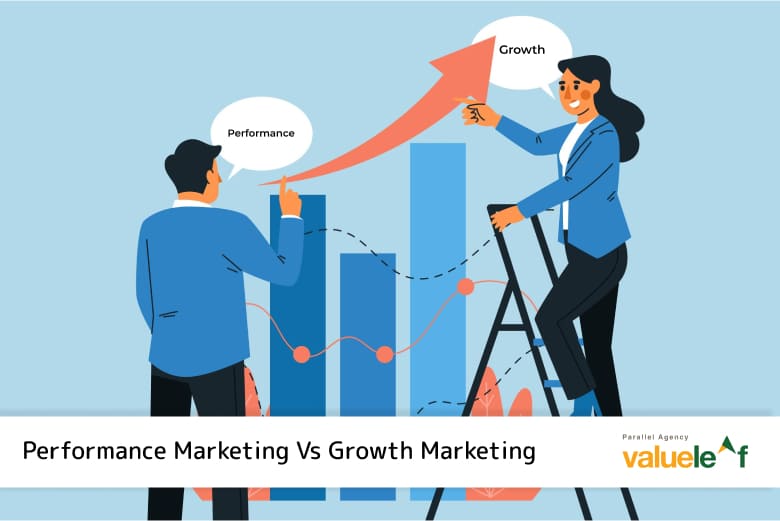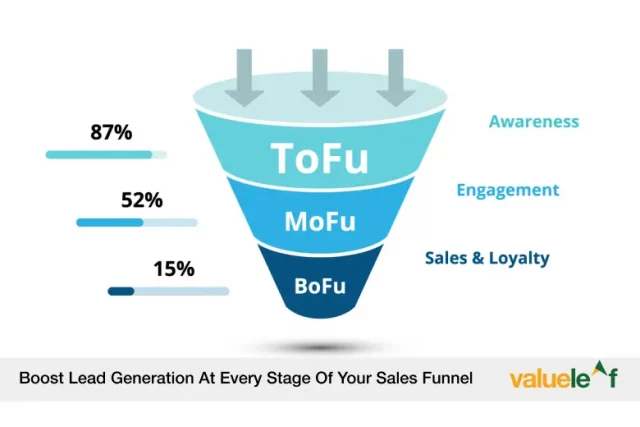Ever wondered which digital marketing strategy holds the key to skyrocketing your business? Unravel the ultimate showdown between Performance Marketing and Growth Marketing to uncover the winning strategy for your business success!
Performance marketing emphasizes immediate, measurable results through data-driven tactics, while growth marketing takes a holistic, experimental approach to achieve sustainable long-term growth. Whether you are seeking quick wins or aiming to cultivate lasting success, understanding the intricacies of performance and growth marketing becomes imperative in today’s fiercely competitive digital landscape.
In this blog, let’s explore the key differences between performance and growth marketing to assist you in selecting the most suitable approach for your business goals. But before that, let’s understand the basics of performance and growth marketing!
What Is Performance Marketing?

Performance marketing is a data-driven strategy that centers on driving specific actions or outcomes that are measurable and quantifiable. It utilizes diverse online channels and tactics to optimize marketing campaigns and achieve desired Returns On Investment (ROI).
Performance marketing revolves around key performance indicators (KPIs) such as conversions, sales, clicks, or downloads. Marketers closely track and analyze these metrics to make informed decisions, allocate resources effectively, and continuously enhance strategies for maximum performance and business growth.
Setting clear performance marketing goals enables targeted actions and aligns marketing efforts with desired outcomes, ensuring focused efforts and measurable success in achieving objectives. Furthermore, we’ll look into the significance of performance marketing to know more.
Significance Of Performance Marketing: Why It Matters?
Performance marketing plays a significant role in maximizing marketing success and achieving specific business objectives. These are the benefits of performance marketing:
Measurable Results:
Performance marketing allows for tracking and measuring specific actions or outcomes, providing valuable insights into the effectiveness of marketing campaigns.
Return on Investment (ROI):
By closely monitoring key performance indicators (KPIs) and optimizing strategies based on data insights, performance marketing ensures efficient resource allocation and maximizes ROI.
Scalable Growth:
By leveraging data-driven insights and refining strategies based on performance, performance marketing enables businesses to achieve sustainable and scalable growth.
Data-Driven Decision Making:
Performance marketing relies on data analysis and insights to inform decision-making, providing valuable information on customer behaviour, preferences, and campaign performance.
Businesses can drive efficient growth and achieve their marketing goals by focusing on measurable outcomes, optimizing strategies, and leveraging data insights. Now, let’s delve into the concept of growth marketing.
What Is Growth Marketing?

Growth marketing is a strategic approach that focuses on achieving sustainable and scalable business expansion. It involves implementing inventive tactics and strategies to broaden customer acquisition, enhance retention rates, and drive overall revenue.
It takes a comprehensive and forward-looking perspective, aiming to identify growth opportunities throughout the customer journey. Establishing well-defined growth marketing objectives is pivotal in directing targeted endeavours and aligning strategies with desired outcomes.
Growth marketing goals encompass augmenting customer acquisition, optimizing customer lifetime value, improving retention rates, and maximizing revenue generation. Organizations can align their marketing initiatives by outlining precise growth marketing objectives, evaluating progress, and consistently optimizing strategies for enduring and impactful growth.
Now that you have gained an understanding of what growth marketing entails, let us explore the significance of this marketing approach.
Significance Of Growth Marketing: Why Is It Important?
Here are some key points highlighting the significance of growth marketing:
Results-Oriented:
Growth marketing focuses on delivering tangible results through metrics like customer acquisition, conversion rates, revenue, and customer lifetime value. It enables businesses to track progress and make data-driven decisions to drive growth.
Agile and Adaptive:
Growth marketing adapts to market dynamics and evolving preferences, emphasizing agility in adjusting strategies based on real-time data. This enables businesses to stay competitive, seize growth opportunities, and respond swiftly to trends and shifts.
User-Centric Approach:
Understanding the target audience is crucial in growth marketing. Marketers gain deep insights into customer behaviour, preferences, and motivations to create personalized experiences that drive engagement and conversion.
Cross-Functional Collaboration:
Growth marketing necessitates cross-team collaboration, fostering cooperation between marketing, product, engineering, design, and data analytics. It breaks down silos and aligns teams towards common growth goals.
Now that you have an understanding of both marketing approaches, let’s explore their potential for working in sync.
Can Performance & Growth Marketing Work On Sync?
Yes, performance marketing and growth marketing can work in sync and complement each other effectively. While they have distinct focuses, both approaches share the common goal of driving business growth and achieving measurable results. Here’s how they can work together:
Data Sharing:
Sharing insights and data between performance and growth marketing teams helps inform strategies and optimize campaigns effectively.
Alignment Of Experimentation And Optimization:
Both approaches rely on continuous testing and refinement, with performance marketing insights informing growth marketing strategies.
User Journey Integration:
Aligning touchpoints optimized by performance marketing with the broader growth strategy ensures a seamless and cohesive customer experience.
Collaborative Goal Setting:
Setting shared goals and key performance indicators (KPIs) ensures both teams work towards common growth metrics.
Iterative Feedback Loop:
Regular feedback and communication between teams facilitate continuous improvement and optimization of marketing efforts.
Let’s delve into which marketing approach would be better for your business in order to determine the one that is best suited for your needs.
Performance Or Growth Marketing: Which Is Good For Your Business?
The best performance and growth metrics and goals for you will depend on your specific business and marketing objectives. However, some general guidelines include:
Performance Marketing Goals
These goals are typically focused on generating leads and sales in the short term. Some common performance marketing goals include:
- Cost Per Acquisition (CPA): The cost of acquiring a new customer.
- Return On Investment (ROI): The amount of money that is earned for every dollar that is spent on marketing.
- Conversion Rate: The percentage of website visitors who take a desired action, such as signing up for a newsletter or making a purchase.
Growth Marketing Goals
These goals are typically focused on building customer relationships and increasing customer lifetime value (CLV) in the long term. Some common growth marketing goals include:
- Customer Acquisition Cost (CAC): The cost of acquiring a new customer.
- Customer Lifetime Value (CLV): The average amount of money that a customer spends with a business over their lifetime.
- Net Promoter Score (NPS): A measure of customer loyalty and satisfaction.
To generate leads and sales quickly, performance marketing goals may be a good fit for you. However, if you are looking to build a sustainable business over the long term, then growth marketing may be a better choice.
Most businesses use a combination of performance and growth marketing. This combination allows them to generate leads and sales quickly while also building a sustainable business over the long term.
Conclusion
When considering performance marketing Vs growth marketing, it’s essential to understand their unique strengths and align them with your business objectives. While performance marketing delivers immediate results and optimization, growth marketing focuses on sustainable, long-term growth.
By combining the strengths of both approaches, you can create a powerful marketing strategy that drives short-term performance while laying the foundation for lasting success. Ultimately, the best marketing approach is one that aligns with your business objectives and helps you achieve measurable and impactful results.
Embrace the opportunity to leverage the best of both worlds and embark on a marketing journey that propels your business towards remarkable growth and achievement.
FAQs
Q: What is the difference between performance marketing and growth marketing?
A: Performance marketing focuses on measurable outcomes, while growth marketing focuses on long-term sustainable growth.
Q: Which marketing approach is more suitable for immediate results?
A: Performance marketing is designed for immediate results and achieving specific targets quickly.
Q: Which marketing strategy is more focused on overall business growth?
A: Growth marketing takes a holistic approach and aims for sustainable, long-term business growth.
Q: Can performance marketing and growth marketing be used together?
A: Yes, performance marketing tactics can be integrated into a broader growth marketing strategy for optimal results.




